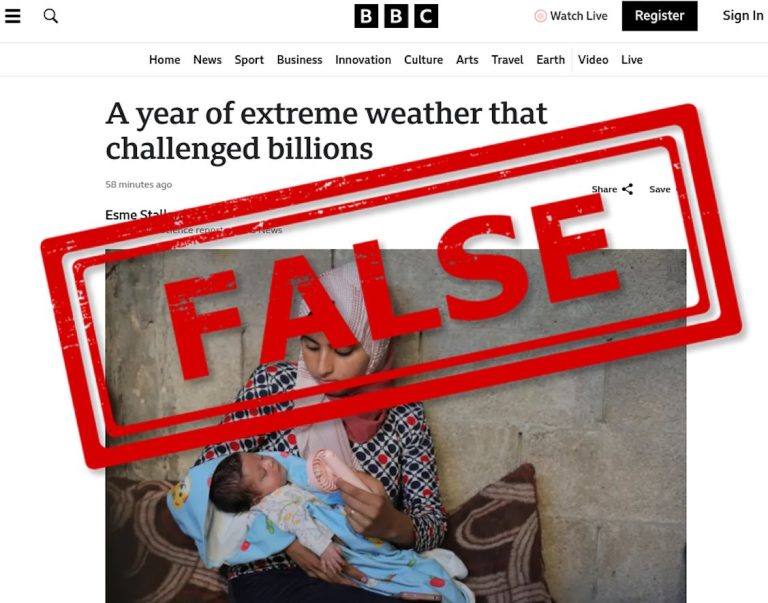
The BBC's recent article, “A Year of Extreme Weather to Challenge Billions”, presents a false narrative that directly attributes various weather events in 2024 to climate change. [emphasis, links added]
It is undeniable that our planet experiences a series of weather phenomena every year; Confusing individual weather events with long-term climate trends oversimplifies and misleads the complex weather and climate system.
It is crucial to distinguish between weather and climate, as the World Meteorological Organization does, and the BBC completely ignores this.
Weather refers to short-term atmospheric conditions, while climate refers to the average of these conditions over longer periods of time (usually 30 years or more).
The lack of scientific rigor in attributing single weather events to climate change, without reliable long-term data demonstrating trends in such events, makes it a baseless claim.
The BBC article highlights the prevalence of heat waves in 2024, showing that heat waves are directly linked to climate change.
However, the United Nations Intergovernmental Panel on Climate Change (IPCC) noted that it has only moderate confidence that the increased frequency of heat waves can be attributed to human influence.;Other factors, including urbanization and land-use change, also play a role.
Attributing heat-related events solely to climate change without taking these variables into account is an oversimplification. See the table below and note Blank indicates lack of attribution to climate change.

The article points to instances of droughts and floods as evidence of climate change. The IPCC report states that Despite regional differences, there is low confidence in attributing increased flooding events to anthropogenic climate change globally.
Likewise, the occurrence of droughts is influenced by multiple factors, including natural variability, making it difficult to attribute them directly to climate change.
Overall, the IPCC said it had found no evidence of increased flooding as a result of climate change and said it did not expect any changes, if any, in floods or droughts after 2050.
This BBC article mentions hurricanes and cyclones in 2024, suggesting a connection to climate change. However, the IPCC reports that there is little confidence in the long-term growth of global tropical cyclone activity.
The data show no clear trends in long-term hurricane/cyclone data. As the Earth has warmed modestly, the number and intensity of tropical cyclones has not increased since 1972, and some data suggest that tropical cyclone frequency has actually declined over the past century.
Tornadoes are not becoming more frequent or powerful.
The media has a responsibility to present information accurately and without bias.
The BBC article conflates individual weather events in 2024 with long-term climate trends, which oversimplifies a complex scientific phenomenon and is not supported by data.
By failing to distinguish between weather and climate, and ignoring the nuances presented by authoritative sources such as the IPCC report, the article is nothing more than sensationalism, not accurate reporting, and violates the journalistic standards of accuracy and impartiality that the BBC claims to uphold. .
In short, the BBC report not only failed to inform the public, but actually misled the public on the issue of climate change.
For a more balanced view on climate-related topics, readers may consider consulting resources such as climate realism, Climate at a glanceand WattsUpWithThatproviding analysis based on data, facts and scientific integrity.
Read more Climate Realism
